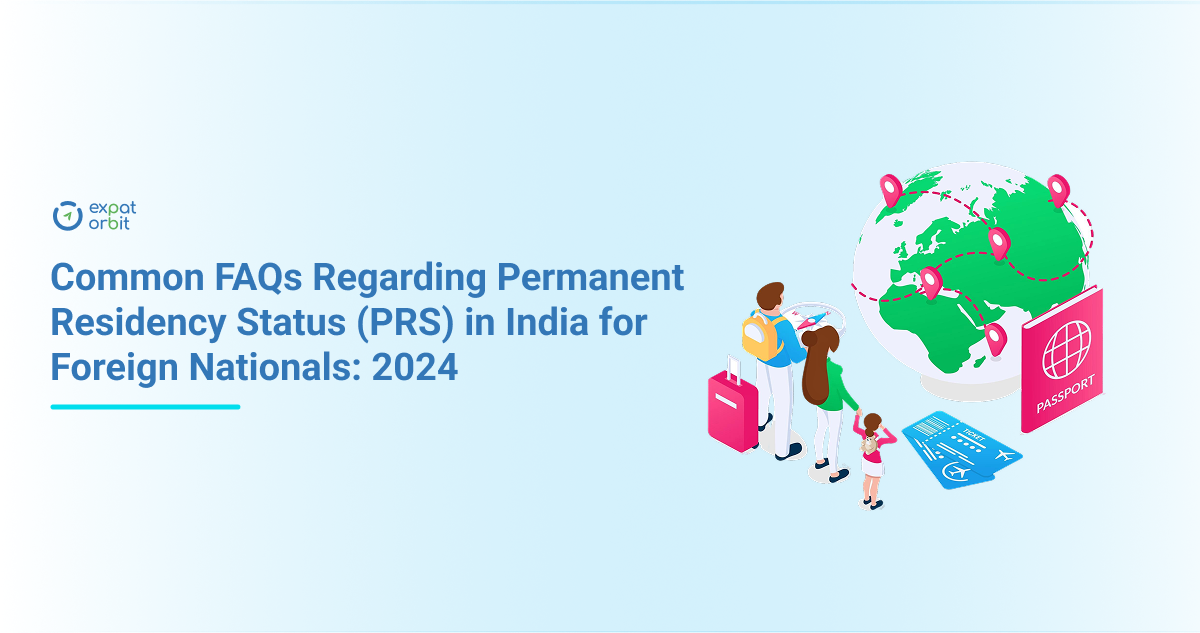Common FAQs Regarding Permanent Residency Status (PRS) in India for Foreign Nationals: 2024

In 2024, India continues to solidify its position as a leading destination for foreign investments, underlining both economic durability and vast market opportunities. During the first half of FY 2023-24, the country attracted $33 billion in FDI, highlighting consistent growth amidst broader global economic challenges.
This is a sharp increase in FDI and underlines the increased confidence that foreign investors have in India as a place for viable, long-term business and investment. The PRS initiative of the Indian government sets in further stride to this momentum by giving foreign investors their long-term security and building a sound base to establish their presence in this growing market. While we’ve already published a detailed guide on obtaining Permanent Residency Status in India, drawing our experience of assisting ambitious foreign investors we have summarised the most common queries to help you understand better the PRS framework in India:
Q 1. What is the Permanent Residency Status (PRS) scheme in India?
The PRS scheme is an initiative by the Indian government to attract foreign nationals who wish to invest in India under the FDI route. This scheme provide a multiple-entry visa without any stay stipulation for an initial period of 10 years , which can be further extended, subject to certain conditions.
Q 2. Who can apply for PRS?
Permanent Residency Status(PRS) is granted to foreign investors investing under the FDI route subject to relevant conditions as specified in the FDI policy notified by the Department of Industrial Policy and Promotion (DIPP) from time to time. To be eligible, the investor must fulfill below two conditions:
- Must invest a minimum of ₹10 crores (approximately $1.5 million USD) within 18 months or ₹25 crores (approximately $3.75 million USD) within 36 months.
- The investment must create employment for at least 20 resident Indians each financial year.
Note: Pakistani citizens or third-country nationals of Pakistani origin are not eligible for PRS.
Q 3. How do I apply for PRS in India?
To apply for Permanent Residency Status (PRS) in India, foreign nationals must first obtain a B-4 visa, specifically designed for investors or entrepreneurs. Depending upon the level of investment promised - ₹ 10 crore or ₹ 25 crore - foreign investors will be granted an initial B-4 visa for 18 months or 36 months respectively.
After fulfilling the investment and employment conditions, the foreign national can apply for PRS by submitting an online application along with the required documents to the Foreign Regional Registration Office (FRRO/FRO).
Grant of PRS is subject to prior clearance from the Ministry of Home Affairs (MHA). Once the clearance process is complete, the applicant must approach the concerned Indian Mission/FRRO/FRO for verification of the documents with originals and biometric data collection.
Q 4. What documents are required for a PRS application?
Applicants must submit the following documents with the FRRO along with the application:
- Valid passport and Visa
- Recent photograph
- Proof of residence - FORM C or Rent Agreement
- Copy of Form FC-GPR
- RBI's acknowledgement letter
- Annual Return on Foreign Liabilities and Assets filed with RBI by the Indian company receiving FDI
- Income Tax Return documents before the Income Tax Department in support of the fulfillment of the eligibility conditions for PRS
Q 5. Can I convert my existing visa into PRS?
No, an existing visa cannot be converted / used to apply for Permanent Residency Status(PRS). A foreign national must first apply for a B-4 visa from their home country. Upon obtaining the B-4 visa, the individual may then apply separately for PRS with the FRRO, once the required investment and employment conditions under the FDI route are fulfilled.
Q 6. How long is the PRS valid for? Can I extend it?
Permanent Residency Status(PRS) is initially granted for a period of 10 years with multiple entry privileges. It can be further extended for another 10 years if nothing adverse comes to the notice of the FRRO. The extension application must be submitted at least 6 months before the expiry of the current PRS card.
Q 7. Can my PRS be cancelled?
Yes, PRS can be revoked by the authorities if certain conditions are not met. This can happen for reasons such as:
- Failure to meet the conditions related to investment and job creation.
- Willful default under RBI guidelines or any relevant laws.
- Declaration of unsound mind by a competent court.
- Undischarged insolvency.
- Conviction by a court for any offense.
- Any other reason making the investor's continued stay in India undesirable.
After cancellation, the PRS holder and their family must leave India within three months, and they must sell any property in accordance with FEMA regulations within one year.
Q 8. What benefits do I get with PRS?
PRS holders enjoy:
- A multiple-entry visa without any stay stipulation for an initial period of 10 years, extendable for another 10 years.
- Exemption from FRRO/FRO registration.
- Employment opportunities for spouses and dependents in the private sector without the need of meeting salary threshold of 16.25 lakh (permission of FRRO/FRO required).
- Permission to undertake studies without student visa for dependent and spouses.
- Eligibility to purchase one residential property for residing purposes.
- The ability to actively engage in business activities in India.
Q 9. What are the compliance requirements for PRS holders?
- PRS holders must provide annual updates to the FRRO/FRO regarding their investment and employment generation activities by submitting the following documents:
- Copy of Form FC-GPR
- Annual Return on Foreign Liabilities and Assets filed with RBI by the Indian company receiving FDI
- RBI's acknowledgement letter
- Income Tax Return filed before the Income Tax Department.
- Details regarding employment generation for resident Indians, based on self-certification by the statutory auditor of the Indian investee company.
- PRS holders staying in hotel or lodges must ensure that the hotels/lodge submits the FORM C to the concerned FRRO/FRO
- Report the concerned FRRO if any change of address or passport
The above FAQs cover the most critical aspects of obtaining Permanent Residency Status (PRS) in India as a foreign national. Understanding these key points can greatly simplify your PRS application journey and ensure you're well-prepared to meet the requirements.
At Expat Orbit, we take pride in providing clear, reliable guidance to foreign nationals exploring India's legal landscape. Should you have any questions or need further clarification on the PRS process, feel free to reach out. Our team is here to assist you in making well-informed decisions about your long-term presence and investment in India.
